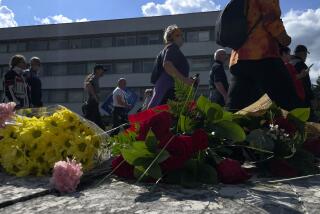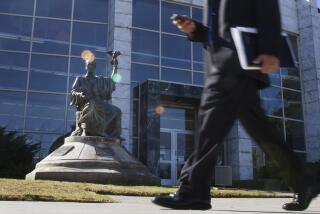Palme Assassination Still a Mystery : Tragedy: Five years after the prime minister was killed, there are no suspects. Scandals have rocked the investigation into the shooting.
- Share via
STOCKHOLM — Five years after a gunman killed Prime Minister Olof Palme as he walked home from a movie, the police have no suspect, no motive and no murder weapon.
The former prime suspect is drinking up the $55,000 in compensation he received after being convicted, then freed on appeal.
The head of the initial investigation left the police force and was convicted of using illegal methods. The number of detectives on the case has been reduced from 300 to 25.
In 1988, the justice minister and national police chief resigned after authorizing and aiding a private investigation that sidestepped the official one.
“We believe in a solution, but we are also realists and we know that, as time passes, this becomes more difficult,” said Chief Detective Hans Olvebro, who took over the case in February, 1988.
Palme was shot down Feb. 28, 1986, on a snowy street while walking home late at night with his wife, Lisbeth. They were not accompanied by bodyguards. The killer escaped through an alley.
Five years of police work have cost $42 million. The $9-million reward offered for information leading to the killer remains untouched.
Police receive telephone calls with tips every day. Olvebro said his team had dealt with “slightly more than half” of the tens of thousands gathered through the years.
The murder shocked and bewildered a nation that had not experienced a political assassination since King Gustav III was shot to death in 1792. The hunt for Palme’s killer and mistakes made by police churned up even more disturbing feelings: suspicion of foreigners and fears of conspiracy.
Libel charges were brought against the author of a book containing speculation that police were connected with the killing.
Some theories were based on Palme’s efforts to stop arms sales to Iran, which was at war with Iraq, and his involvement in Swedish weapon sales to India.
“Swedes can handle ordinary things, like making pea soup and cars and social security, but can’t handle extraordinary things,” said Anders Ferm, chief editor of the newspaper Arbetet and a former close associate of Palme.
Ferm said the unsolved murder hampers honest debate of Palme’s career.
“We haven’t been able to discuss the legacy and political implications in normal terms,” he said. “It’s still discussed in a traumatic way.”
Palme, a passionate politician who could be aggressive and scornful of opponents, dominated the governing Social Democratic Party for 20 years.
For months after the shooting, hundreds of people placed flowers at the corner in central Stockholm where he died. Red roses covered the sidewalk for more than two years and the lane was renamed Olof Palme’s Street.
On the first anniversary, 10,000 torch-bearing mourners walked past Palme’s grave, 200 yards from the murder site.
Last December, Olvebro appeared on television seeking witnesses other than those who testified at the 1989 trial of Christer Pettersson.
Lisbeth Palme identified Pettersson as the man she saw standing near her husband after the shots were fired. She did not see the gun or the shooting, she said.
Pettersson, 43, had served prison terms for manslaughter, drug possession and petty crimes. He was convicted, but freed by an appeals court.
In press interviews, Pettersson said he had spent at least two-thirds of the compensation awarded him last May. He told the weekly magazine Z that he had spent $5,400 on beer.
Chief Detective Hans Holmer, head of the initial investigation, was accused of mishandling the case and resigned in 1987.
He and two former senior security police officials were convicted and fined in December for illegal eavesdropping on the militant Kurdish Workers Party. They had suspected party members of involvement in Palme’s murder.
Justice Minister Anna-Greta Leijon and Nils-Arik Ahmansson, chief of the national police, resigned in 1988 after revelations that they sanctioned the unofficial investigation.
“As long as we have work to do and material to go through, we can’t give up,” Olvebro said.
“This summer, we and the prosecutors will sit down and evaluate the situation. From there, we will decide how many people should stay on this.”
More to Read
Sign up for Essential California
The most important California stories and recommendations in your inbox every morning.
You may occasionally receive promotional content from the Los Angeles Times.













